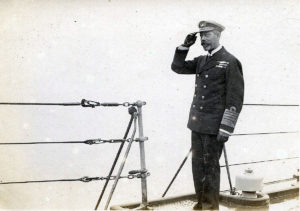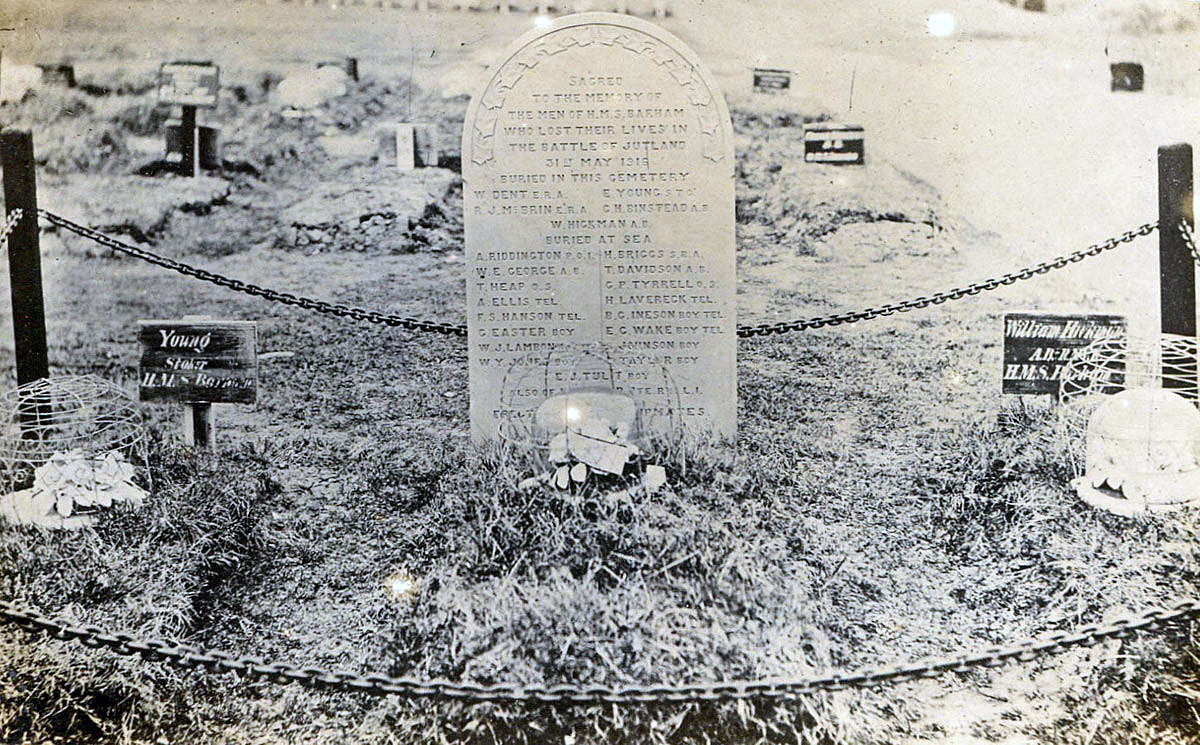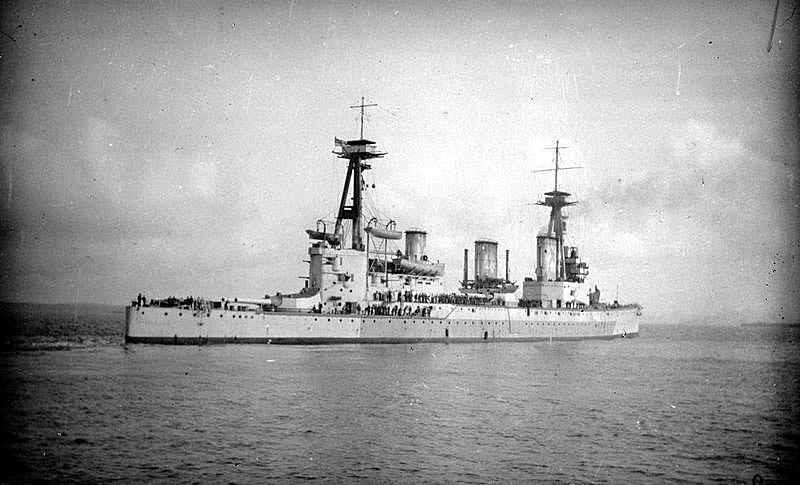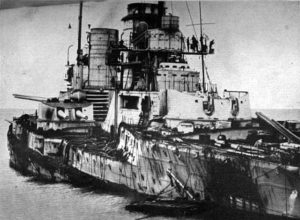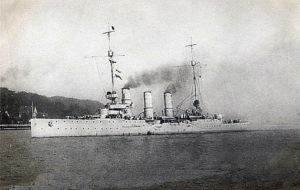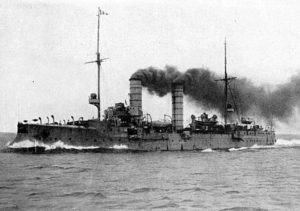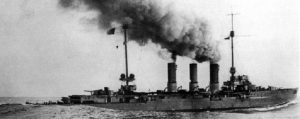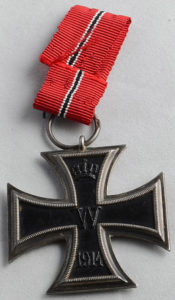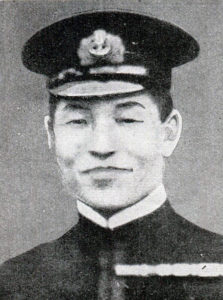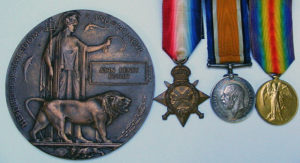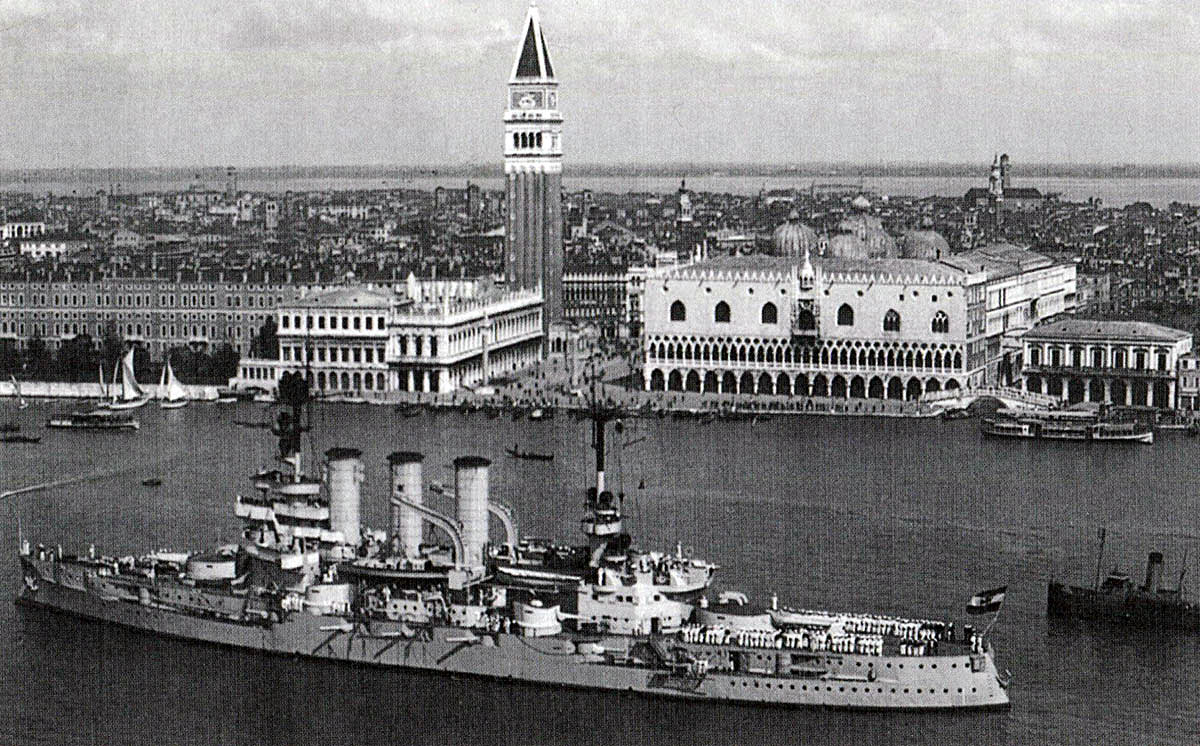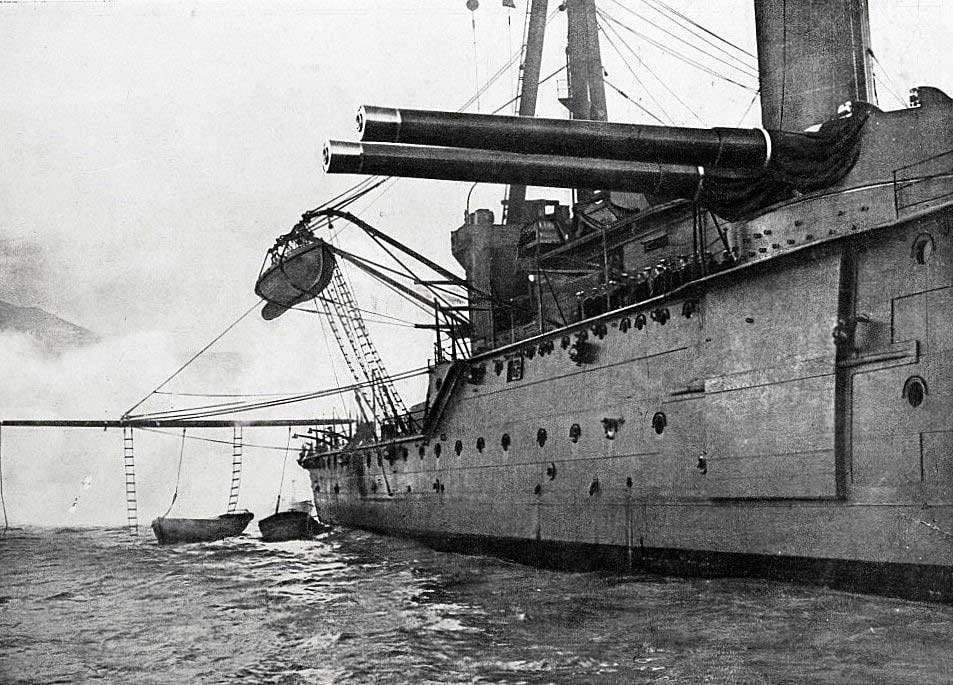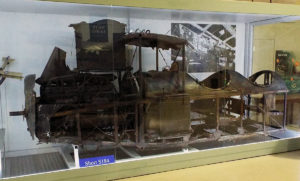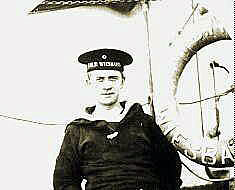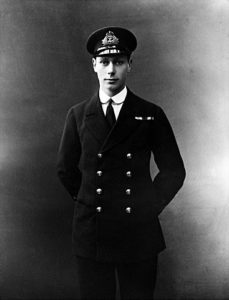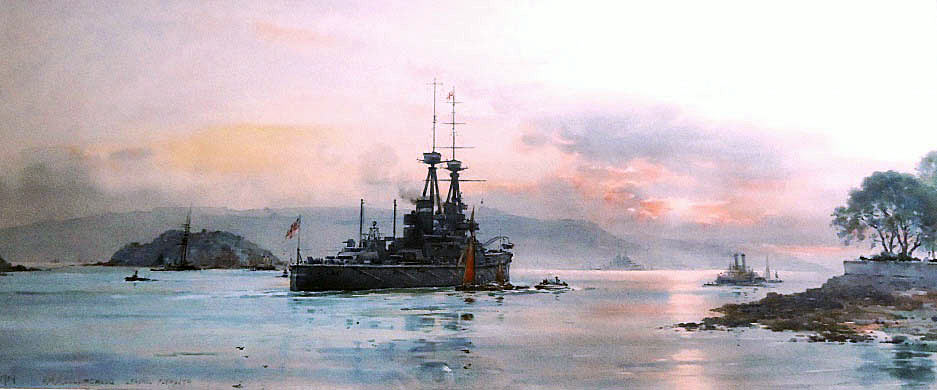The Titanic struggle between the British Grand Fleet and the German High Seas Fleet on 31st May 1916
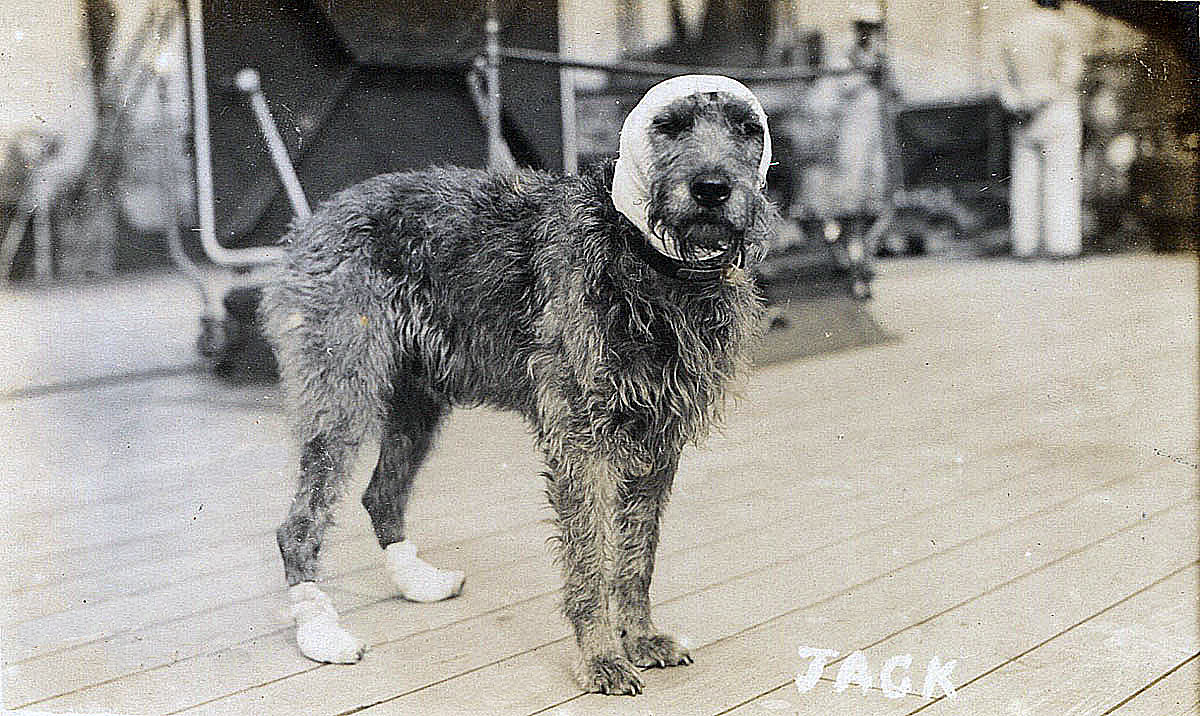
Vice Admiral Evan-Thomas’s dog Jack wounded at the Battle of Jutland 31st May 1916 on board HMS Barham
The previous battle of the First World War is the Battle of Jutland Part IV: the Night Action 31st May to 1st June 1916
Aftermath to the Battle of Jutland:
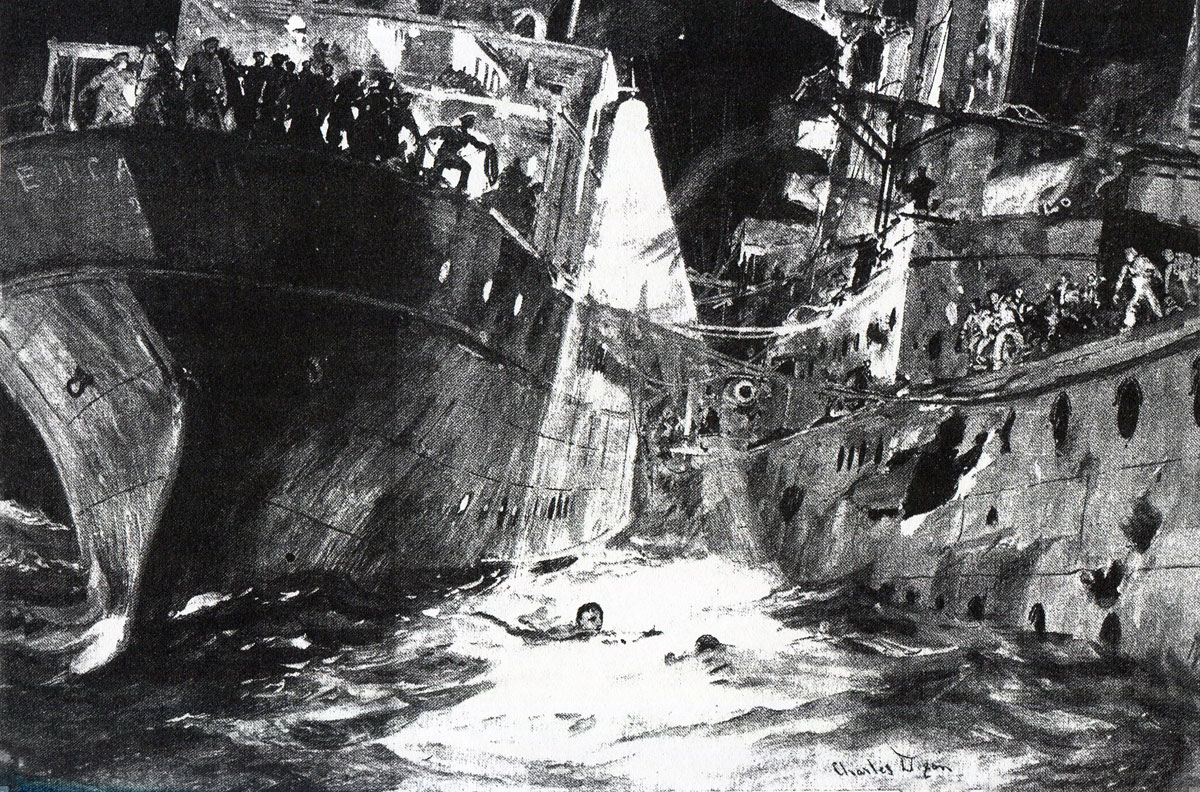
Flight Lieutenant Rutland in the sea between HMS Engadine and HMS Warrior at the end of the Battle of Jutland 1st June 1916 in the First World War
HMS Warrior:
Following the destruction of HMS Defence, HMS Warrior escaped to the west out of the battle area where she met up with Admiral Beatty’s Seaplane Carrier HMS Engadine. With considerable difficulty, being a much smaller ship, Engadine took Warrior in tow. Warrior was filling with water and during the night became increasingly difficult to manage.
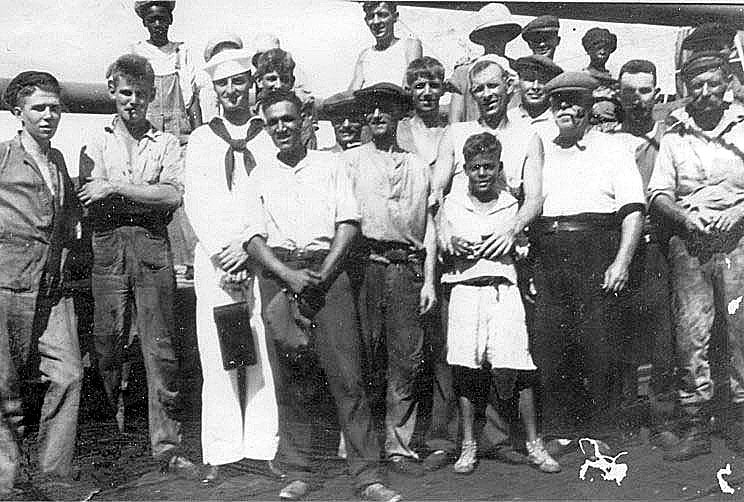
Members of the crew of British Battle Cruiser HMS Indefatigable: Indefatigable was sunk at the Battle of Jutland 31st May 1916
On the morning of 1st June 1916 the weather worsened and it was decided to transfer Warrior’s crew to Engadine and abandon the now sinking Warrior. As an ex-cross Channel excursion vessel Engadine was fitted with strong rubbing strakes and the captain Lieutenant-Commander Robinson RNR with considerable skill managed to bring Engadine alongside the wallowing armoured cruiser.
Warrior’s crew transferred across. The wounded were moved in cradles. One wounded man, a double leg amputee, slipped out of his cradle into the sea between the ships. Two Warrior officers were ordered not to attempt a rescue as too dangerous.
Flight Lieutenant Rutland, the pilot of the Short 184 that had carried out the reconnaissance at the beginning of the Battle of Jutland, climbed down the side of the ship unnoticed made his way to the sailor and recovered him with a line. It was found that the wounded man had been crushed to death between the ships. Rutland received the Albert Medal First Class for Attempting to Save Life. Warrior sank the next night.
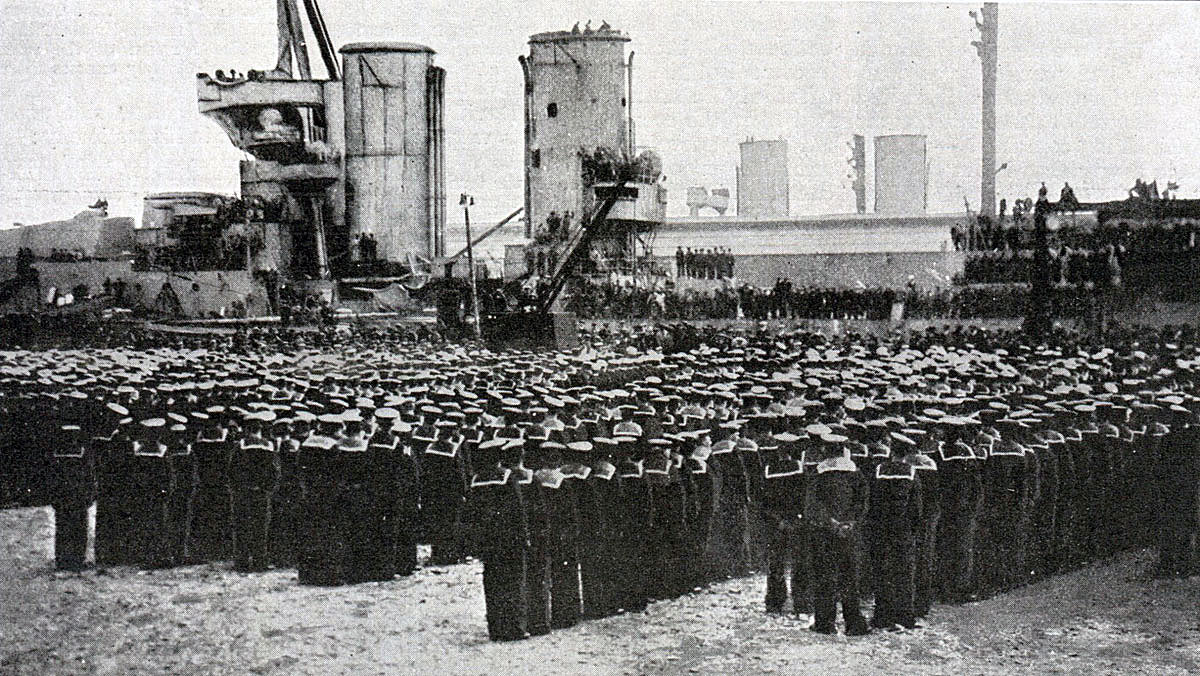
King George V addressing a parade of sailors from the Grand Fleet after the Battle of Jutland speaking from the deck of the badly damaged HMS Warspite
Once the two national fleets returned to harbour each was addressed by its sovereign. King George V addressed a parade of sailors of the Grand Fleet from the deck of the badly damaged HMS Warspite. Kaiser Wilhelm II addressed his officers and sailors in Kiel Harbour. Each congratulated his navy on a resounding victory.
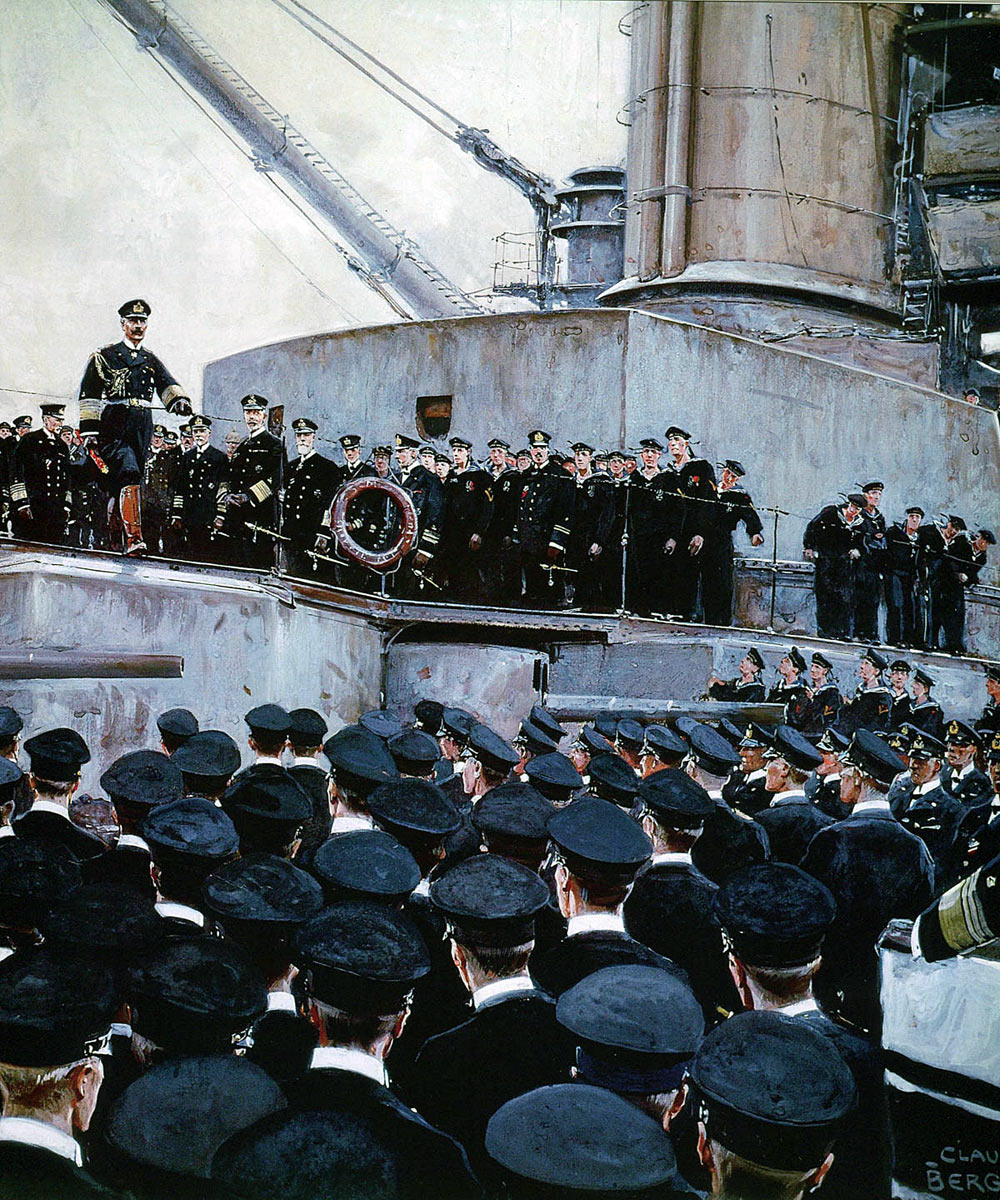
Kaiser Wilhelm II addressing officers of his High Seas Fleet after the Battle of Jutland: picture by Claus Bergen
Casualties:
Royal Navy
Battleships:
Barham 26 (4 officers) killed 37 (1 officer) wounded
Colossus 5 wounded
Malaya 63 (2 officers) killed 33 wounded
Marlborough 2 wounded
Valiant 1 wounded
Warspite 14 (1 officer) killed 16 (3 officers) wounded
Battle Cruisers:
Indefatigable (sunk) 1,017 (57 officers) killed 2 taken prisoner
Invincible (sunk) 1,026 (61 officers) killed
Lion 99 (6 officers) killed 44 (1 officer) wounded
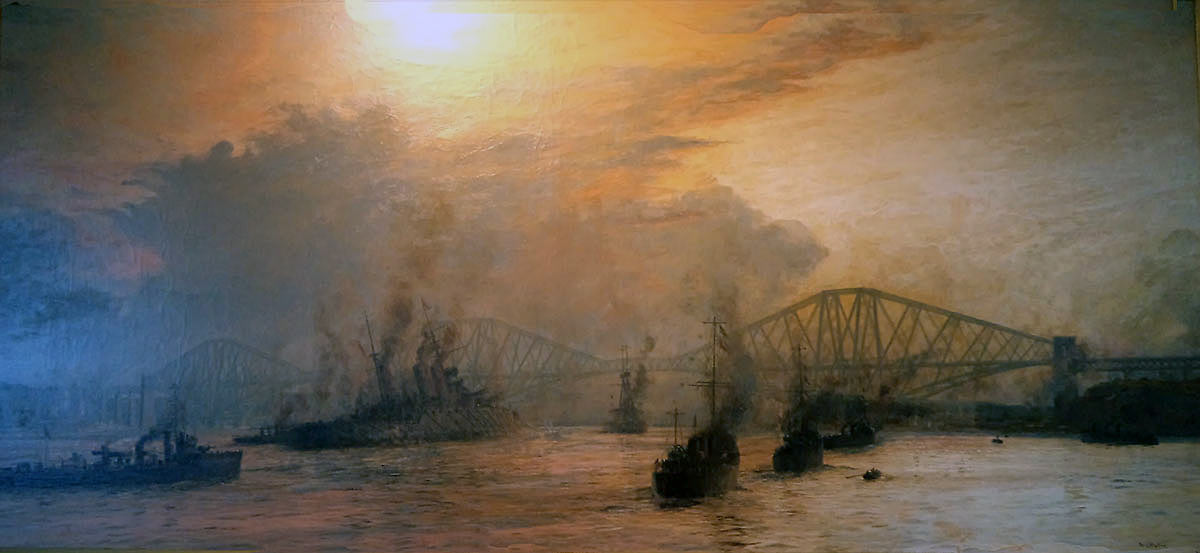
‘Wounded Lion’ by Lionel Wyllie. The British Batttle Cruiser HMS Lion, Flagship of Admiral Beatty, lies in the Firth of Forth after the Battle of Jutland on 31st May 1916, the Forth Railway Bridge in the background
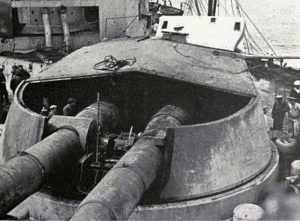
Damage to Q Turret on British Battle Cruiser HMS Lion which led to the deaths of around 50 of her crew and nearly destroyed the ship at the Battle of Jutland 31st May 1916
Princess Royal 22 killed 78 (1 officer) wounded
Queen Mary (sunk) 1,266 (57 officers) killed 7 (2 officer) wounded 2 taken prisoner (1 officer)
Tiger 24 (2 officers) killed 37 wounded
Cruisers:
Black Prince (sunk) 857 (37 officers) killed
Defence (sunk) 903 (54 officers) killed
Warrior (sunk) 71 (1 officer) killed 27 (2 officers) wounded
Light Cruisers:
Calliope 10 killed 9 (2 officers) wounded
Castor 13 killed 24 (2 officers) wounded
Chester 35 (2 officers) killed 42 (3 officers) wounded
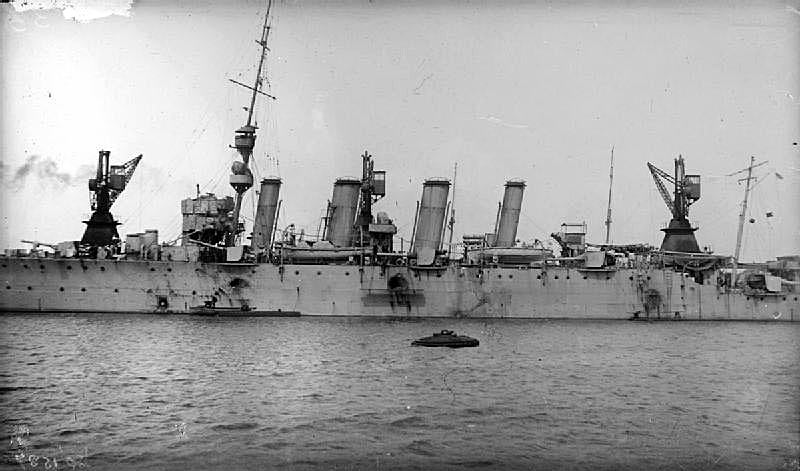
British Light Cruiser HMS Chester showing the damage she suffered in the Battle of Jutland 31st May 1916 (see Battle of Jutland Part II). First Class Boy Jack Cornwell received a posthumous Victoria Cross for his conduct
Dublin 3 (1 officer) killed 24 wounded
Southampton 35 killed 41 (1 officer) wounded
Flotilla Leaders:
Broke 47 (1 officer) killed 36 (3 officers) wounded
Tipperary (sunk) 185 (11 officers) killed 2 wounded 8 taken prisoner
Destroyers:
Acasta 6 (1 officer) killed 1 wounded
Ardent (sunk) 78 (4 officers) killed 2 (1 officer) wounded
Defender 1 killed 2 wounded
Fortune (sunk) 67 (4 officers) killed 1 wounded
Morsom 1 wounded
Nessus 7 (2 officers) killed 7 wounded
Nestor (sunk) 6 (2 officers) killed 4 wounded 75 taken prisoner
Nomad (sunk) 8 (1 officer) killed 7 wounded
Onslaught 5 (3 officers) killed 2 wounded
Onslow 2 killed 3 wounded
Petard 9 (2 officers) killed 6 (1 officer) wounded
Porpoise 2 killed 2 wounded
Shark (sunk) 86 (7 officers) killed 2 wounded
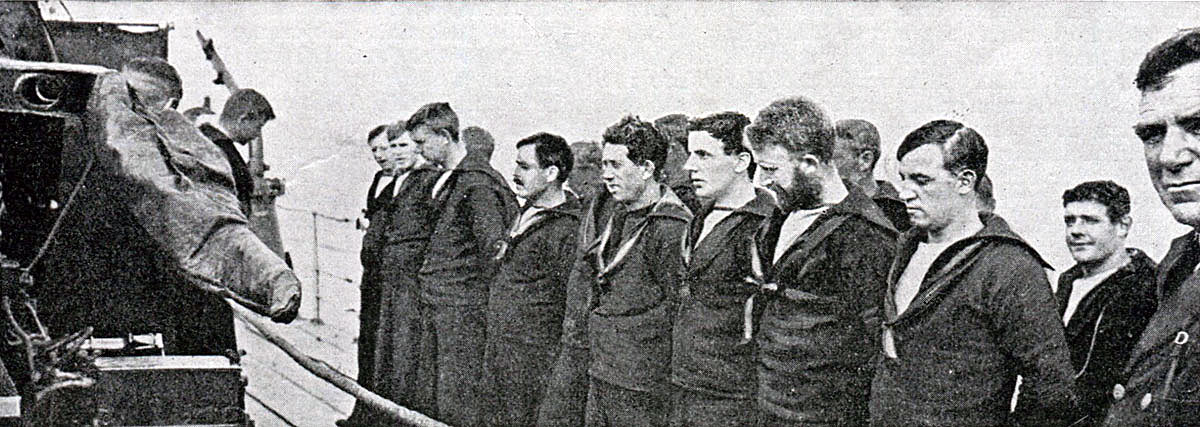
Members of the crew of HMS Shark before the Battle of Jutland on 31st May 1916. Probably none of the men in the photograph survived the battle
Sparrowhawk 6 killed
Spitfire 6 killed 19 (3 officers) wounded
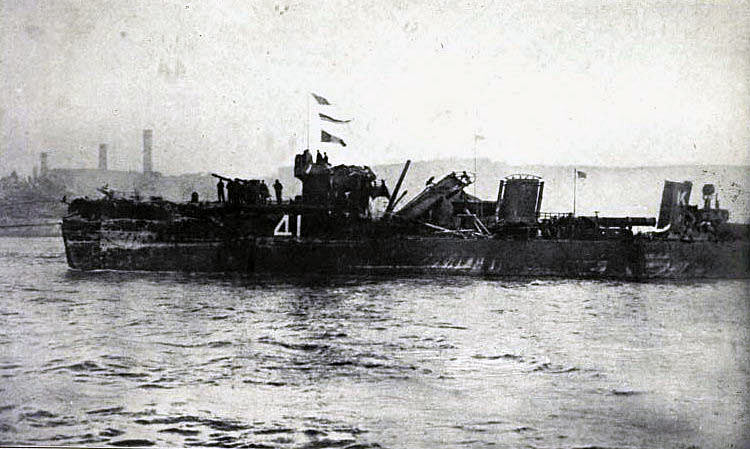
HMS Spitfire entering the Tyne on 2nd June 1916 showing the damage suffered in her collision with the German ship
Turbulent (sunk) 90 (5 officers) killed 13 taken prisoner
TOTALS of British casualties at the Battle of Jutland 31st May 1916:
Officers: 328 killed 25 wounded 10 taken prisoner
Sailors: (and civilians on-board) 5,769 killed 485 wounded 167 taken prisoner
German Imperial Navy
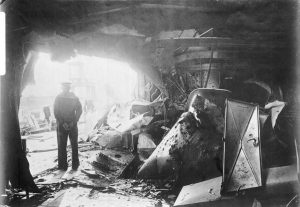
Sailor standing in the hole blown in the side of German Battle Cruiser SMS Derfflinger during the Battle of Jutland 31st May 1916
Battleships:
Grosser Kürfurst 15 (3 officers) killed 11 (1 officer) wounded
Kaiser 1 wounded
König 45 (1 officer) killed 27 (1 officer) wounded
Markgraf 11 killed 13 (1 officer) wounded
Nassau 12 (2 officers) killed 15 (2 officers) wounded
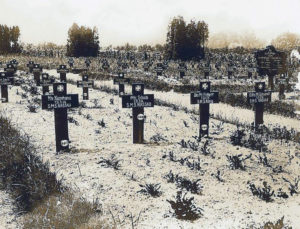
Graves of sailors from the German Battleship SMS Nassau killed at the Battle of Jutland on 31st May 1916
Oldenburg 8 (4 officers) killed 14 (3 officers) wounded
Ostfriesland 1 killed 10 wounded
Pommern (sunk) 840 (71 officers) killed
Rheinland 10 killed 20 (1 officer) wounded
Schliesien 1 killed 1 officer wounded
Schleswig-Holstein 3 killed 8 wounded
Westphalen 2 killed 8 (1 officer) wounded
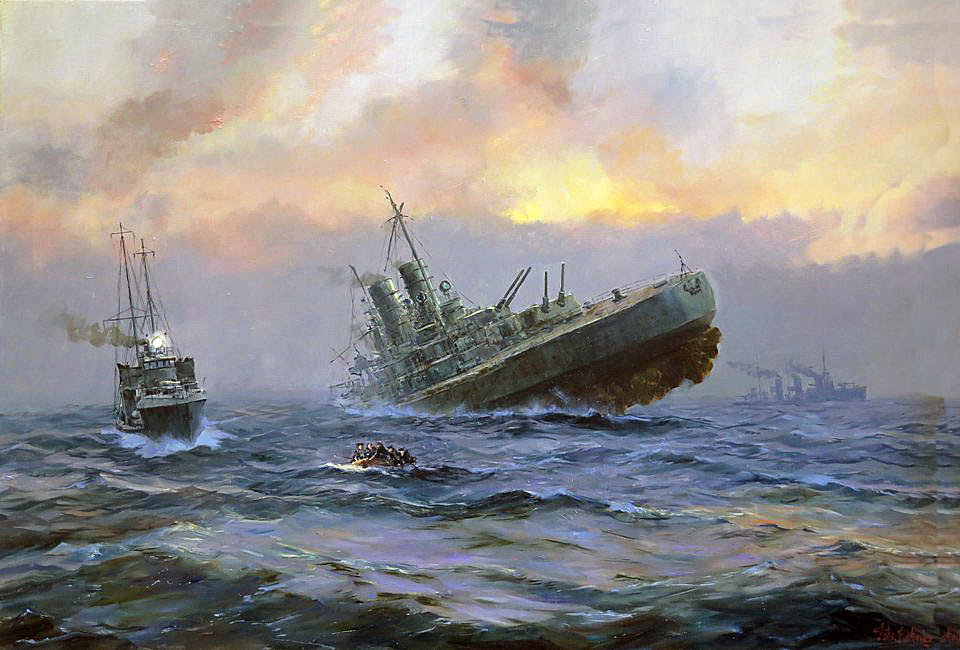
German Battle Cruiser SMS Lützow sinking after being scuttled by a torpedo fired from a German vessel at the Battle of Jutland on 31st May 1916: picture by Moller
Battle Cruisers:
Derfflinger 154 (1 officer) killed 26 (2 officers) wounded
Lützow (sunk) 111 (5 officers) killed 54 (5 officers) wounded
Moltke 17 killed 22 wounded
Seydlitz 98 (5 officers) killed 50 (4 officers) wounded
Von der Tann 12 (1 officer) killed 35 (3 officers) wounded
Light Cruisers:
Elbing (sunk) 4 killed 10 (1 officer) wounded
Frankfurt 3 (1 officer) killed 21 (1 officer) wounded
Frauenlob (sunk) 342 (17 officers) killed
Hamburg 14 (1 officer) killed 25 (4 officers) wounded
München 8 (1 officer) killed 19 (4 officers) wounded
Pillau 4 killed 23 wounded
Rostock 14 (1 officer) killed 6 wounded
Stettin 9 killed 27 (1 officer) wounded
Wiesbaden (sunk) 570 (27 officers) killed
Torpedo Boats/Destroyers
B98 2 killed 10 wounded
G40 1 killed 1 wounded
S32 3 killed 1 wounded
V4 (sunk) 18 (1 officer) killed 4 wounded
V48 (sunk) 92 (6 officers) killed
Sixth Flotilla 3 killed 16 (3 officers) wounded
Ninth Flotilla 120 (12 officers) killed 15 wounded
TOTALS of German casualties at the Battle of Jutland 31st May 1916:
Officers: 160 killed 40 wounded
Sailors: 2,385 killed 454 wounded
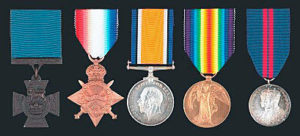
Victoria Cross and medals of Commander Loftus Jones RN awarded posthumously for his conduct at the Battle of Jutland 31st May 1916
British Awards for Gallantry:
Knighthoods and appointments to the orders of chivalry associated with the armed services were made to officers who had distinguished themselves in the battle.
Victoria Crosses (four) were awarded for conduct at the Battle of Jutland to:
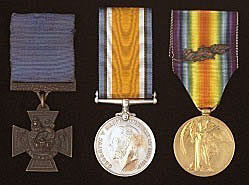
Victoria Cross and medals awarded to First Class Boy Jack Cornwell awarded posthumously for his conduct at the Battle of Jutland 31st May 1916
Commander Bingham captain of the Destroyer HMS Nestor of HMS Champion’s 13th Flotilla for the attack on the German Battle Cruisers early in the Battle of Jutland. Bingham was captured with the survivors of his crew (see Battle of Jutland Part II).
Major Harvey commander of HMS Lion’s ‘Q’ Turret posthumously (see Battle of Jutland Part II).
First Class Boy Jack Cornwell of HMS Chester (see Battle of Jutland Part III).
Commander Loftus Jones captain of the Destroyer HMS Shark posthumously (see Battle of Jutland Part III).
Some 40 Distinguished Service Orders were awarded to Royal Navy and Royal Marines Officers.
Some 13 Distinguished Service Crosses were awarded to Royal Navy and Royal Marines Officers including Flight Lieutenant Frederick Rutland the pilot of the Short 184 Seaplane that conducted the initial air reconnaissance and who subsequently rescued the wounded sailor from HMS Warrior and to Lieutenant Cuthbert Coppinger RN Navigating Officer of HMS Canterbury (see ‘Coppinger of Jutland’).
Some 65 Distinguished Service Medals were awarded to non-commissioned ranks including DSMs to the survivors of the crew from HMS Shark P/O Griffin, P/O Fillend and A/Bs Hope, Smith, Howell and Stoker Swan who were picked up by a Danish merchant ship (see Battle of Jutland Part III).
A large number of French and Russian awards were made to all ranks.
Anecdotes:
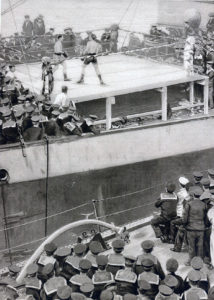
The boxing competition conducted on board the ‘Sports Ship’ HMS Borodino at Scapa Flow on 30th May 1916 before the Battle of Jutland
- This much anticipated battle in the North Sea was referred to in Germany as ‘Der Tag’, the expression being taken up by the Royal Navy as ‘The Day’. Subsequently ‘Der Tag’ was used to describe the day the German Fleet surrendered to the British in November 1918 and was escorted to Scapa Flow, where most of the German ships were scuttled by their crews.
- The Grand Fleet was conducting a boxing tournament on 30th May 1916 when the orders were received to go to sea. There was a headlong rush to return the boxers and spectators to their ships. The boxing competition was conducted on board the ‘Sports Ship’ HMS Borodino with the crews of the ships brought over by drifters and picket boats. So great was the urgency to get the crews back to their ships that the Borodino went round the fleet delivering its spectators.
- Following her performance at the Dogger Bank Action SMS Derfflinger was given the nickname ‘The Iron Dog’ by the Royal Navy.
- The Germans were particularly struck by the accuracy of the firing from the British Battleship HMS Valiant.
- It was found during the battle that the Germans had not been able to modify their torpedoes to conceal the surface wake as the British had. It was consequently much easier to avoid approaching German torpedoes as their wake could be seen.
- A member of the disabled destroyer Spitfire’s crew described their encounter with HMS Black Prince during the night (see Battle of Jutland Part IV): ‘Suddenly there was a cry from nearly a dozen people at once, ‘Look out!’ I looked up, and saw a few hundred yards away, on our starboard quarter, what appeared to be a battle cruiser on fire, steering straight for our stern….. To our intense relief she missed our stern by a few feet, but so close was she to us that it seemed that we were actually under her guns, which were trained out on her starboard beam. She tore past us with a roar, rather like a motor roaring up hill on low gear, and the very crackling and heat of the flames could be heard and felt. She was a mass of fire from fore-mast to main-mast, on deck and between decks… flames were issuing out of her from every corner…. Soon afterwards, about midnight, there came an explosion from the direction in which she had disappeared.’
- One of the officers lost on HMS Queen Mary when she blew up (see Battle of Jutland Part II) was Commander Shimomura of the Imperial Japanese Navy who was serving an attachment on the ship Japan and Britain being allies in the First World War.
- The survivors of HMS Invincible were Commander Dannreuther the gunnery officer (who had been Invincible’s gunnery officer at the Battle of the Falklands on 8th December 1914), Lieutenant Sandford, CPO Thompson and three ratings. All had been in the control top and were blown clear when the ship blew up. They were picked up by the destroyer HMS Badger. Badger’s crew were expecting to pick up German sailors and were surprised to find the survivors were British naval personnel headed by a commander.
- Many of the British capital ships at Jutland continued to serve and fought in the Second World War. All the Queen Elizabeth battleships did so. HMS Barham blew up in 1940 after being torpedoed. HMS Warspite was badly damaged during the fighting around Crete in 1942. HMS King George V’s successor battleship played a major role in the sinking of the German Battleship Bismark in 1941.
- By the Treaty of Versailles which ended the First World War, Germany was prevented from keeping any of her capital ships, other than pre-Dreadnoughts. All Germany’s Dreadnoughts were handed to the Allies, although many were scuttled by their crews in Scapa Flow in 1918. Several pre-Dreadnoughts that fought at Jutland continued in the German naval service up to and through the Second World War.
- The oldest capital ship at Jutland SMS Hessen continued in service with succeeding German navies until 1946 when she was handed to the Soviet Union and disappeared, a length of service of at least 43 years.
- SMS Schleswig-Holstein fired the first naval shot of the Second World War bombarding Danzig on 1st September 1939 (see the picture by Claus Bergen in Battle of Jutland Part I).
- In spite of being in the thick of the fighting from the beginning of the Battle of Jutland, the Battle Cruiser HMS New Zealand suffered no casualties and no damage. On a subsequent refit in dry dock, a dent was found that may have been caused during the battle. During a visit to New Zealand (the ship was paid for and donated to the Royal Navy by the New Zealand Government) before the war, Maori chiefs predicted that the ship would come to no harm. They presented a Maori kilt to the captain, and told him to wear it whenever the ship went into action. As the battle began, a sailor took a quick look onto the bridge, to check the captain was wearing the kilt, and was able to reassure his messmates, who took the requirement very seriously.
- Flight Lieutenant Rutland, who flew the seaplane reconnaissance in the opening minutes of the battle (see Battle of Jutland Part II), was awarded the DSC. His seaplane was destroyed during the Blitz in 1940. The remains of the seaplane are in the Fleet Air Arm Museum.
- Bodies of British and German sailors were washed ashore over the days following the Battle of Jutland at Väderöbod north of Gothenberg in Sweden. British casualties are now buried in the Commonwealth War Graves Commission Kvlberg Cemetery near Gothenburg.
- One of the crew members on the German Light Cruiser SMS Weisbaden was the author, Johann Wilhelm Kinau. Under the pseudonym Gorch Fock, Kinau wrote the popular book ‘Seefahrt ist nott’. After serving in the German army, Kinau transferred to the Navy and was a lookout on the Wiesbaden. A father with three children, Kinau died with the rest of the ship’s crew at the Battle of Jutland on 31st May 1916, his body washed ashore in Sweden. He became something of a national hero. Kinau was adopted by the Nazis as an important German author, although there seems to be little evidence that his views coincided with National Socialism.
- The future King George VI, Prince Albert, served as a midshipman in the Battleship HMS Colossus during the Battle of Jutland. He was a member of the gun team in ‘A’ Turret and came under fire. Prince Albert was known as ‘Mr Johnson’.
- Commander Hubert Dannreuther RN, the sole surviving officer from HMS Invincible, received the DSO, the French Croix de Chevalier de La Legion d’Honneur and the Russian Order of St Anne 3rd Class (with swords). Dannreuther, the Gunnery Control Officer on Invincible, was blown clear from his position at the top of the ship when she exploded. Moments before the end, Admiral Hood called out to Dannreuther commending him on his shooting. Dannreuther was Gunnery Control Officer on Invincible at the Battle of Heligoland Bight, and at the Battle of the Falkland Islands, when Admiral Sturdee’s ships sank the German Squadron of Admiral Graf von Spee, comprising the Scharnhorst, Gneisenau, Leipzig and Nürnberg; the light cruiser Dresden escaping to be caught in 1915.
- Several of the photographs of the Battle Cruiser Fleet at the Battle of Jutland (see Battle of Jutland Part II) were taken by Paymaster Lieutenant Arthur Dyce Duckworth. Duckworth was present at the Battle of the Falkland Islands, taking a series of photographs of the pursuit of Admiral Graf Spee’s squadron from the upper works of HMS Invincible. Duckworth was posted out of Invincible before the Battle of Jutland. He went on to write an authoritative handbook on Naval court martial proceedings. The stock of his book was destroyed during a German air raid on Plymouth in 1940. It was the practice of Royal Navy officers in the First World War to form syndicates and buy a camera. An officer with a non-combatant role would take photographs during action, which would then be sold to the press.
References for the Battle of Jutland:
Official History of the Great War Naval Operations Volume III by Sir Julian Corbett
The Great War Part 14 by Winston Churchill
More Sea Fights of the Great War Wyllie, Owen and Kirkpatrick
The Great War Volume 7 by Wilson and Hammerton
History of the Royal Navy World War I by Farquharson-Roberts
Times History of the Great War
The Fighting at Jutland by Fawcett and Hooper
Conway’s All the World’s Fighting Ships 1906-1821Jane’s Fighting Ships of World War I
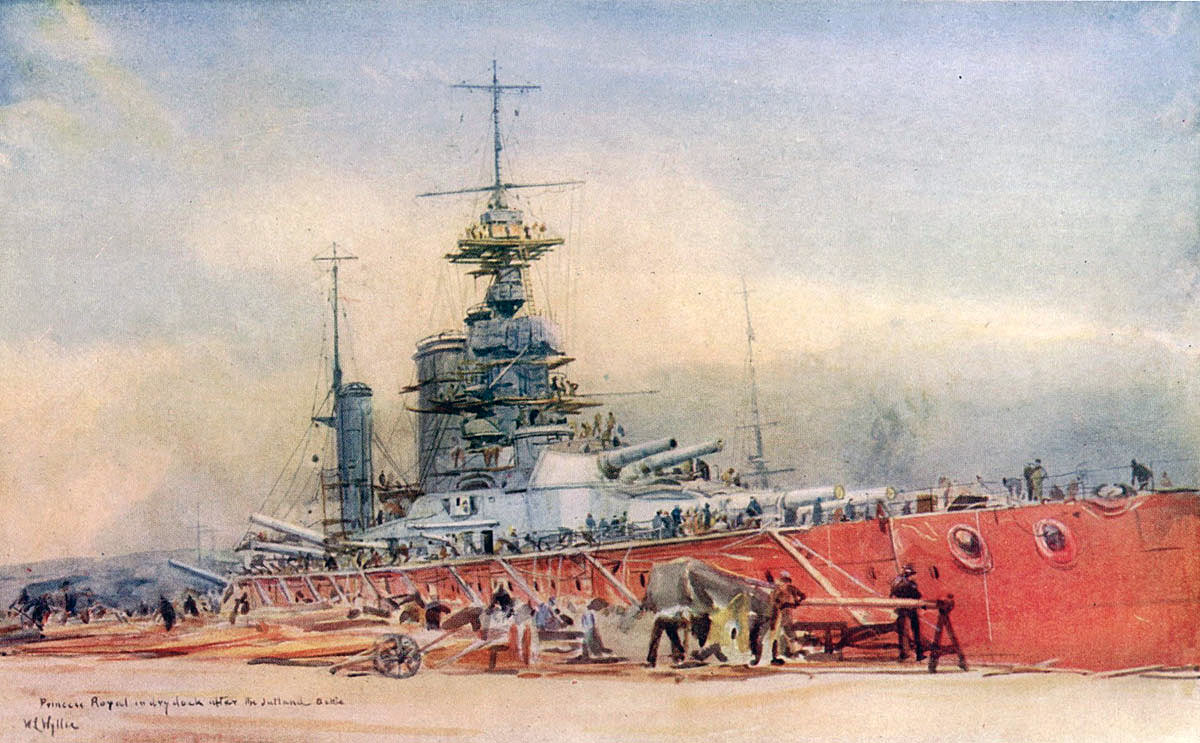
British Battle Cruiser HMS Princess Royal in dry dock after the Battle of Jutland 31st May 1916: picture by Lionel Wyllie
The previous battle of the First World War is the Battle of Jutland Part IV: the Night Action 31st May to 1st June 1916
